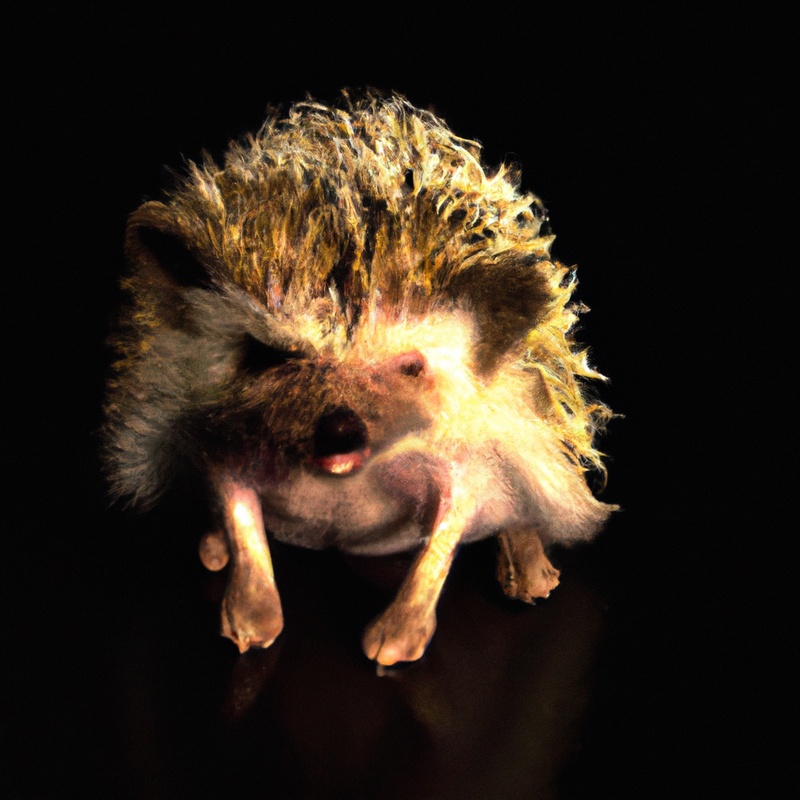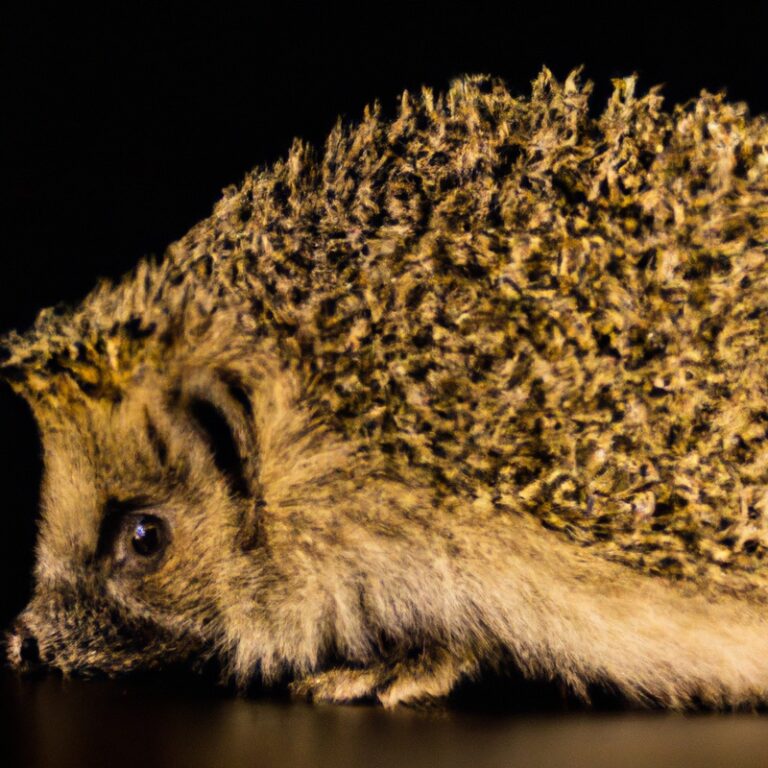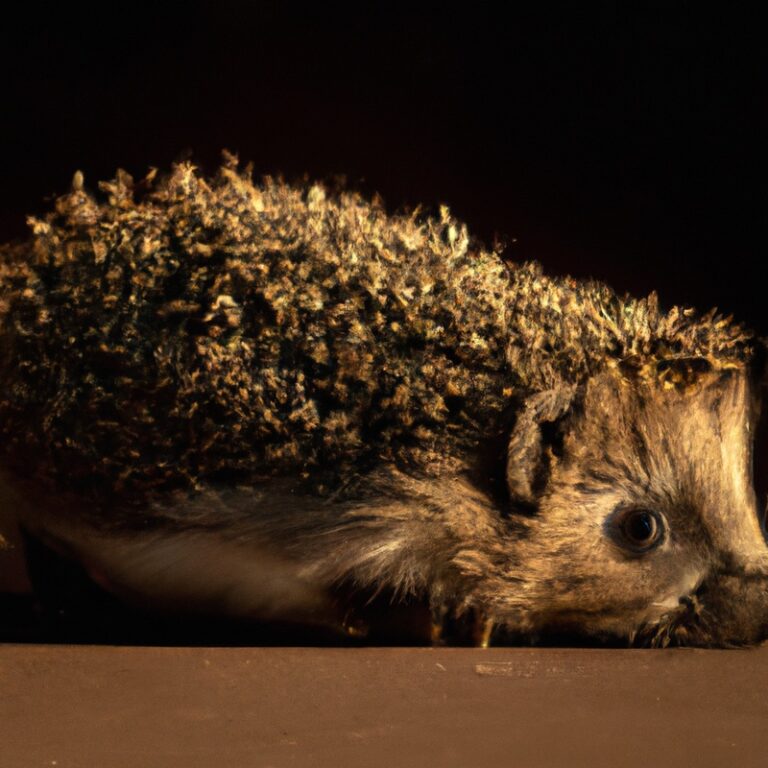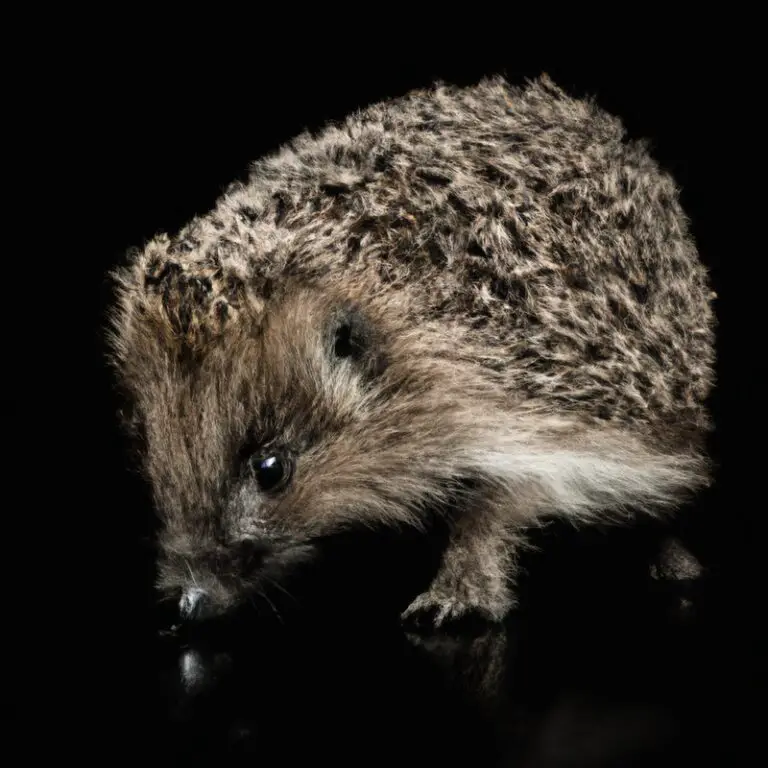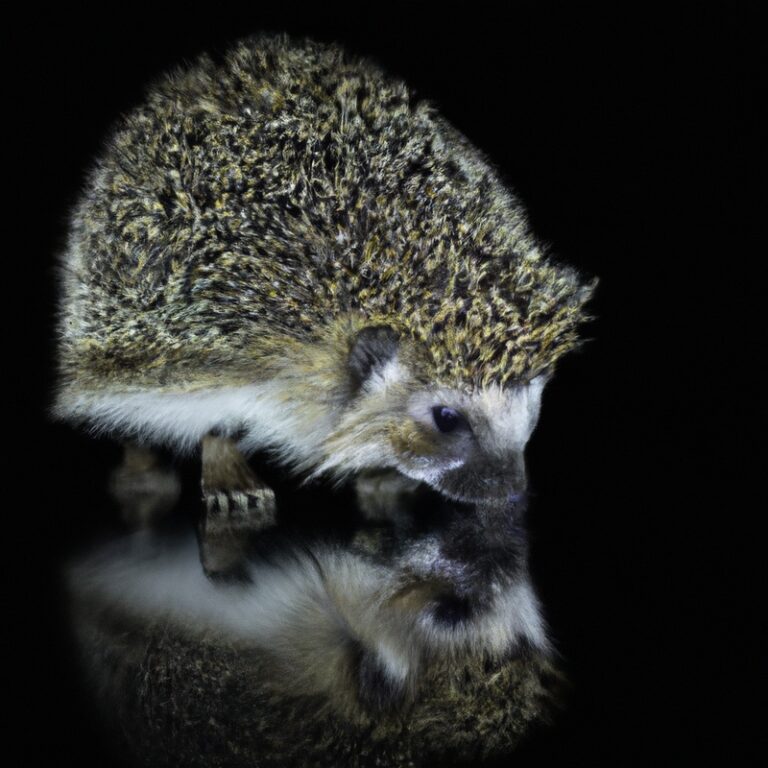How Do Hedgehogs Find Food At Night?
Key Takeaways:
- Hedgehogs use their excellent sense of smell to locate food in the dark.
- They have a natural ability to detect and follow scent trails left by insects and other small creatures.
- Hedgehogs primarily rely on their hearing to locate rustling sounds made by potential food sources.
- Their foraging behavior and ability to adapt to different environments help them find food even in low light conditions.
Are you curious to know how hedgehogs manage to find food in the darkness of the night?
Well, these adorable little creatures have some fascinating tricks up their spiky sleeves! In this article, we will delve into the nocturnal nature of hedgehogs and explore their sensory abilities that allow them to navigate through the darkness.
From their exceptional sense of smell to their keen hearing and night vision, hedgehogs possess an impressive arsenal of tools to help them locate their next meal.
We will also uncover their food preferences and the techniques they employ to search for sustenance during their nighttime adventures.
So, let’s dive in and unravel the secrets of how hedgehogs find food at night!
| Method | Description |
|---|---|
| Smell | Hedgehogs have a keen sense of smell and can sniff out their prey, including insects, worms, and small mammals. |
| Hearing | Hedgehogs have excellent hearing and can listen for the movement of their prey. They can detect the rustling of leaves or the scurrying of small animals. |
| Tactile sensation | Hedgehogs have sensitive whiskers that help them to detect objects and vibrations in their surroundings. They can feel the texture of the ground and detect movements of their prey. |
| Memory | Hedgehogs have a good memory and can remember the location of food sources. They will revisit areas where they have previously found food. |
| Exploration | Hedgehogs are curious animals and will explore their environment to find new sources of food. They may search under shrubs, in tall grass, or in other hiding places. |
The Nocturnal Nature of Hedgehogs
Hedgehogs are nocturnal animals, meaning they are most active during the night.
They have adapted to this lifestyle in order to maximize their chances of finding food and avoiding predators.
Understanding Hedgehogs’ Nighttime Behavior
Hedgehogs are nocturnal creatures, meaning they are most active during the night. During this time, they exhibit certain behaviors that help them navigate and find food.
They have excellent hearing and can detect prey and predators using their large ears.
Hedgehogs also rely on their sharp sense of smell to locate food in the dark. Their quills, which serve as a defense mechanism, are important for their nighttime behavior as they help protect them while they search for food.
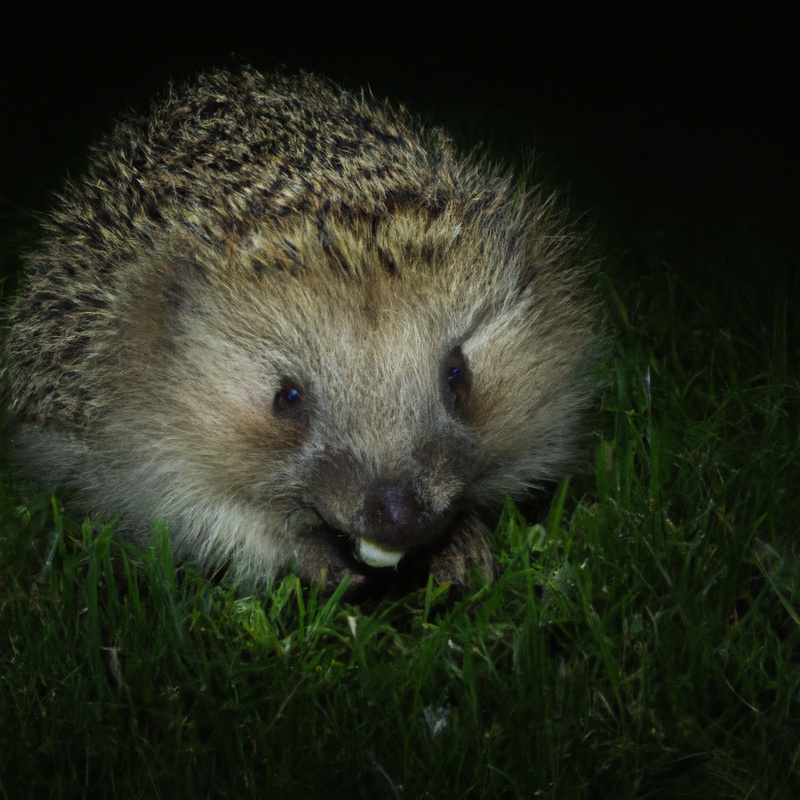
Hedgehogs’ Sensory Abilities
Hedgehogs have remarkable sensory abilities that help them navigate and find food in the dark.
Their sense of smell is particularly well-developed, allowing them to detect prey and locate food sources.
They can also rely on their excellent hearing to detect the sounds of their prey moving through grass or under leaves.
Additionally, hedgehogs have sensitive whiskers that help them feel their environment and locate obstacles.
The combination of these sensory abilities allows hedgehogs to successfully find food and survive in their nocturnal lifestyle.
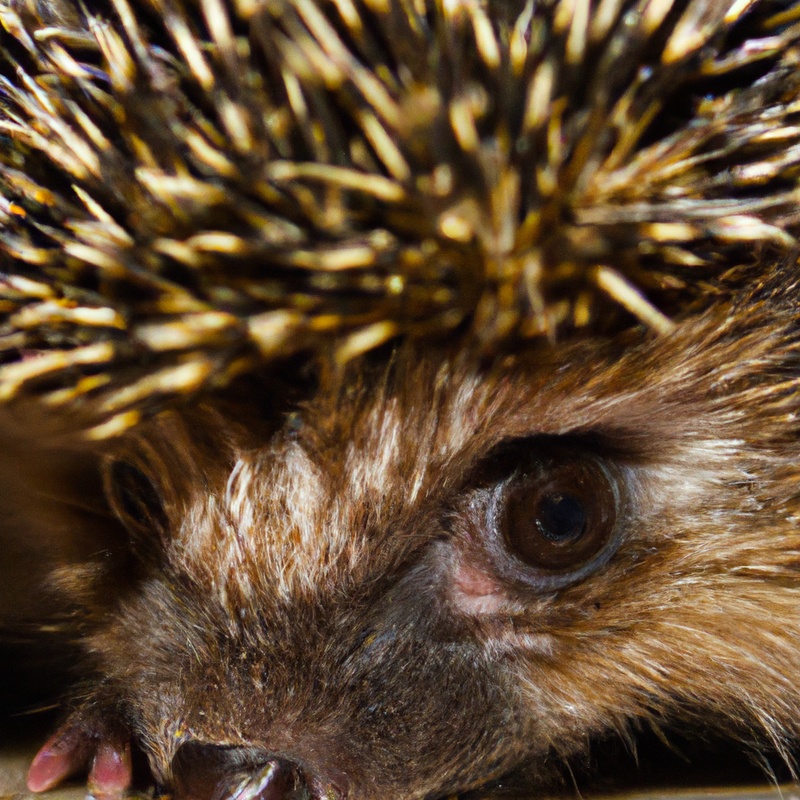
Hedgehogs’ Sense of Smell
Hedgehogs have an exceptional sense of smell, which plays a vital role in their survival. Their sense of smell is highly sensitive and helps them find food, locate mates, and detect predators.
Hedgehogs rely on their scent receptors to detect scents in their environment, allowing them to navigate and interact with their surroundings.
This keen sense of smell enables hedgehogs to track down insects, worms, and other small prey items, even in the dark. Their remarkable olfactory abilities are a key adaptation that helps them thrive in their nocturnal habitat.
Hedgehogs’ Hearing Abilities
Hedgehogs have impressive hearing abilities that help them navigate and find food at night. Their large external ears can pick up a wide range of sounds, allowing them to detect potential prey or predators.
They have a keen sense of hearing, which helps them locate insects, worms, and other small creatures that make noise as they move.
This acute hearing, combined with their excellent sense of smell, enables hedgehogs to find food even in the darkness of night. They truly are remarkable creatures!
Hedgehogs’ Night Vision
Hedgehogs have excellent night vision, enabling them to navigate and find food in the dark.
Their eyes contain a high number of rod cells, which are sensitive to low light levels.
This allows them to see well in dimly lit environments, such as at dusk or during moonlit nights.
Hedgehogs also have large pupils that dilate in the dark, letting in more light and enhancing their vision.
Their sharp sense of smell further helps them locate food sources, even in the absence of adequate lighting.
Hedgehogs’ Food Preferences
Hedgehogs have specific preferences when it comes to their food.
Hedgehogs’ Natural Diet
Hedgehogs’ natural diet mainly consists of insects, worms, slugs, and other small invertebrates.
They are insectivores by nature, meaning they primarily eat bugs.
Hedgehogs use their keen sense of smell to locate their prey, and their sharp teeth help them chew through the exoskeletons of insects.
They are also known to consume some plant matter, such as fruits and vegetables, but their diet consists mainly of protein-rich invertebrates.
Insects and Other Invertebrates
Insects and other invertebrates play a vital role in the diet of hedgehogs.
Hedgehogs are opportunistic eaters and will consume various insects, such as beetles, caterpillars, and slugs.
These invertebrates provide the necessary protein and nutrients that hedgehogs need to thrive.
Hedgehogs also feed on earthworms, which are a favorite among them.
They use their excellent sense of smell to detect and locate these small creatures, especially at night when they are most active.
The abundance of insects and other invertebrates in an area is an important factor that determines the success of hedgehogs in finding food.
Fruits and Vegetables
Fruits and vegetables are not the primary food source for hedgehogs.
Although they are omnivores, they prefer insects, worms, and small animals.
However, fresh fruits and vegetables can be offered as occasional treats.
Hedgehogs enjoy fruits like apples, bananas, and berries, but make sure to remove any seeds or pits.
Leafy greens such as spinach and kale can also be given, but avoid giving them too much as it may upset their digestive system.
Remember, a varied diet is important for their overall health.
Small Mammals and Amphibians
Small mammals and amphibians are important food sources for hedgehogs. Hedgehogs are opportunistic feeders and will eat a variety of small mammals such as mice, voles, and shrews.
They also consume amphibians like frogs and toads, which can provide a good source of protein.
Hedgehogs hunt for these prey items using their excellent sense of smell and hearing. They use their snouts to sniff out their prey and their large ears to detect their movements.
Once they locate their target, hedgehogs will pounce on it and use their sharp teeth to capture and consume their meal.
Techniques Used by Hedgehogs to Find Food at Night
Hedgehogs use foraging and scavenging, rooting and digging, and smell detection techniques to find food at night.
Foraging and Scavenging
Foraging is the process of actively searching for food by hedgehogs.
They use their keen sense of smell to detect the presence of insects, worms, and other small creatures.
Hedgehogs are opportunistic scavengers as well, meaning they will eat carrion or food left behind by other animals.
Both foraging and scavenging are essential for hedgehogs to meet their dietary needs and survive.
So, while foraging allows them to actively hunt for prey, scavenging provides them with an additional food source.
Rooting and Digging
Hedgehogs use rooting and digging as techniques to find food at night.
They have a keen sense of smell that helps them locate their prey, such as insects and worms, hidden in the soil.
By using their snout and sharp claws, hedgehogs root around the ground, creating small holes or digging into softer earth.
This allows them to uncover their prey and feed on it.
Rooting and digging are natural behaviors for hedgehogs and essential for their survival in finding food.
Smell Detection
Hedgehogs have an exceptional sense of smell, which they rely on to find their food at night.
Their long snouts and sensitive noses allow them to detect the scent particles in the air.
They can pick up on the smells of insects, worms, and other small creatures that they feed on.
Their keen sense of smell helps them navigate through the darkness and locate their prey efficiently.
With their incredible olfactory abilities, hedgehogs can follow the scent trails and track down their next meal.
Additional Factors That Influence Hedgehogs’ Food Finding Abilities
Other factors impacting hedgehogs’ ability to find food include habitat and environmental factors, seasonal changes and food availability, as well as competition and predation.
Habitat and Environmental Factors
Habitat and environmental factors play a significant role in hedgehogs’ ability to find food at night.
Here are some important points to consider:
- Vegetation: Hedgehogs prefer areas with dense vegetation such as shrubs and hedges. These provide cover, protection, and a source of insects and other small prey.
- Availability of prey: Hedgehogs rely on a diet of insects, worms, slugs, and snails. Therefore, habitats rich in these prey species are essential for their food finding abilities.
- Access to water: Hedgehogs also need a source of water nearby, especially during dry periods, as they get most of their water from their food.
- Noise and disturbance: Loud noises, bright lights, and frequent human activity can disturb hedgehogs and make them less likely to venture out in search of food.
- Predators: The presence of predators, such as foxes and dogs, can also impact hedgehogs’ foraging behavior.
By understanding and considering these habitat and environmental factors, we can help create a conducive environment for hedgehogs and support their food finding abilities at night.
Seasonal Changes and Food Availability
Seasonal changes greatly affect the food availability for hedgehogs. In the summer, when insects are abundant, hedgehogs have no trouble finding food.
However, during the winter months, when insects are scarce, hedgehogs must rely on alternative food sources such as nuts, fruits, and even small mammals.
Hedgehogs have the ability to adapt their diet based on the availability of food, ensuring their survival throughout the year.
Competition and Predation
Competition and predation play a significant role in influencing hedgehogs’ food finding abilities. In terms of competition, hedgehogs may have to compete with other animals, such as badgers or foxes, for food resources.
This competition can affect the availability and accessibility of food for hedgehogs.
Predation is another factor that influences hedgehogs’ food finding abilities. Hedgehogs are prey for a range of animals, including owls, foxes, and domestic dogs.
As a result, hedgehogs must remain cautious and aware of potential predators while searching for food.
These factors of competition and predation can affect hedgehogs’ behavior and movement patterns, as they must balance their need to find food with the risk of encountering competitors or predators. Understanding and considering these factors is crucial in studying hedgehogs’ foraging habits and implementing effective conservation strategies to support their survival.
Frequently Asked Questions
Q: Do hedgehogs only eat at night?
Hedgehogs are primarily nocturnal creatures, which means they are most active at night. However, they are not strictly limited to feeding only during the nighttime.
Hedgehogs may also eat during the early morning and evening hours.
They have a keen sense of smell and can use their snouts to search for food. Hedgehogs are opportunistic feeders and will eat a variety of insects, worms, slugs, and even small mammals if they come across them.
So, while hedgehogs are more active at night, they are not exclusively restricted to feeding during those hours.
Q: How far can hedgehogs travel to find food at night?
Hedgehogs can travel up to 2 miles per night in search of food.
They have a great sense of smell that helps them locate insects, worms, and other small creatures to eat.
Hedgehogs are nocturnal animals, meaning they are most active at night when they go out on their foraging adventures.
Their small size allows them to navigate through various environments, including gardens, fields, and even urban areas, in their quest for food.
So, if you have a hedgehog visiting your garden at night, they could be traveling quite a distance in search of a tasty meal.
Q: Can hedgehogs find food in urban areas?
Hedgehogs are resourceful creatures and they can indeed find food in urban areas. Despite the presence of concrete and buildings, hedgehogs are known to adapt to their surroundings.
They rely on their keen sense of smell to locate insects, worms, slugs, and snails that may be hiding in gardens, parks, or even compost piles.
Additionally, bird feeders and pet food left out can serve as a supplemental food source. So, if you live in an urban area and are wondering whether hedgehogs can find food, rest assured they have their ways!
Q: Are there any foods that hedgehogs should avoid?
There are certain foods that hedgehogs should avoid. Avoid feeding them chocolate, dairy products, grapes, raisins, and any food that is high in sugar or salt.
These can be harmful to their health and digestive system.
Additionally, avoid giving them any food that is processed or high in fat. Stick to a balanced diet of hedgehog-friendly food, such as insects, fruits, vegetables, and specially formulated hedgehog food.
Be sure to provide fresh water as well.
Q: Can hedgehogs eat cat or dog food?
Yes, hedgehogs can eat cat or dog food.
It’s important to choose high-quality, meat-based options without any added flavors or preservatives.
Dry food is better than wet food, as it helps to keep their teeth clean.
However, it shouldn’t be their main diet, as hedgehogs need a variety of foods to ensure proper nutrition.
Fresh fruits, vegetables, and insects are also essential for their well-being.
Remember to always provide fresh water for your hedgehog.
Q: What can I do to attract hedgehogs to my garden at night?
To attract hedgehogs to your garden at night, you can follow these simple steps:
- Provide a safe space: Create a hedgehog-friendly environment by leaving areas of your garden untidy, with piles of leaves or logs for them to hide in.
- Offer food and water: Leave out a dish of water and specialized hedgehog food, or cat/dog food, to supplement their natural diet.
- Avoid the use of chemicals: Hedgehogs are sensitive to pesticides, so try to avoid using chemicals in your garden.
- Install a hedgehog house: Provide a shelter for hedgehogs to rest and hibernate in by placing a hedgehog house in a quiet part of your garden.
By incorporating these measures, you’ll be creating an inviting space for hedgehogs to visit and enjoy your garden at night.
Final Verdict
Hedgehogs’ nocturnal nature and sensory abilities play a crucial role in their ability to find food at night. Their heightened sense of smell, acute hearing, and night vision enable them to navigate their surroundings and locate prey effectively.
Hedgehogs’ natural diet consists of insects, fruits, and small mammals, and they use various techniques such as foraging, rooting, and smell detection to find food.
Environmental factors, seasonal changes, and competition also influence their food finding abilities. Overall, creating a hedgehog-friendly habitat and providing appropriate food can attract these adorable creatures to your garden at night.

